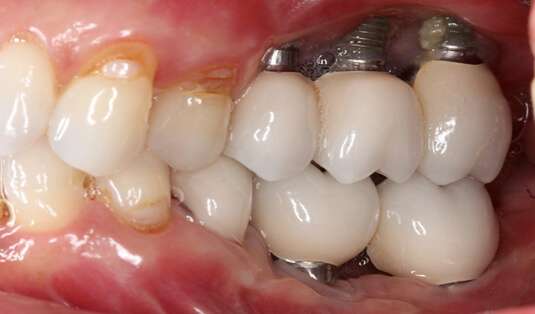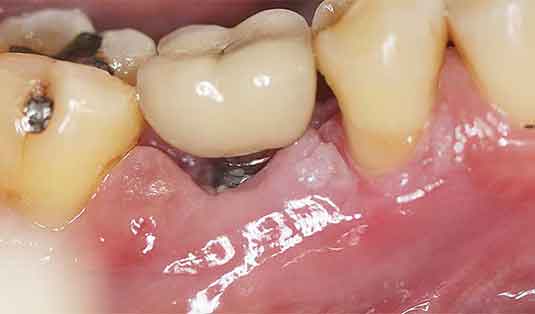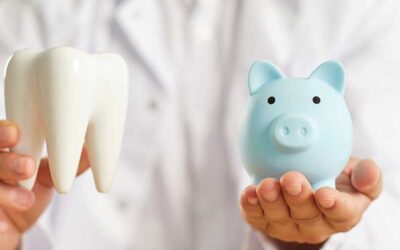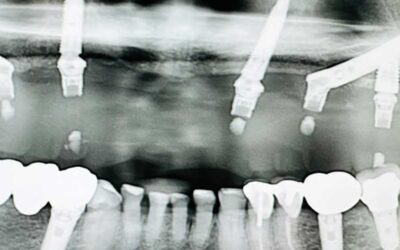Can I Get Dental Implants With Severe Gum Disease
Two of the most important criteria for someone who wants to get dental implants are healthy bone support and healthy gums. But what about people who have missing teeth because of past gum disease and bone loss? Can they still qualify for dental implants? Yes, but only after establishing a healthy oral environment. Thankfully, our Los Angeles periodontists can help.
Symptoms of Gum Disease
Periodontal disease (gum disease) affects natural teeth and the supporting bone and gum tissue around them. Symptoms often include things like:
- Bad breath
- Bleeding gums
- Receding gums
- Tooth loss and mobility
- Tartar buildup
Unless treated early, gum disease will gradually progress further into the supporting oral tissues. Therefore, severe periodontal disease doesn’t just jeopardize your smile; it also affects your overall wellness.
Swollen or receding gum tissue may not seem like a serious issue if you’re about to have your teeth removed or they are already missing. But as gum disease progresses, the severe bone loss that it causes will affect your dental implant options in the future.
If You Currently Have Gum Disease
The biggest risk to dental implants is gum disease. Technically, the implant form of gum disease is called peri-implantitis. The infected gums around your artificial tooth roots can cause them to pull back away from them. As the gum inflammation spreads, it weakens the attached tissues and the underlying bone support.
If you’re someone who is already suffering from severe gum disease, you’ll want to undergo periodontal disease treatment prior to your tooth replacement appointment.
Existing teeth that you plan on keeping will need to undergo periodontal disease therapy, such as deep cleanings, laser pocket decontamination, non-surgical scaling and root planing or other soft tissue treatment. Once the surrounding bone and gums are stabilized, you can have implants placed adjacent to those teeth. But if severe gum disease is causing loose teeth, it may be necessary to extract those teeth altogether. After the teeth are removed, we wait for the right oral environment (where your overall oral health is stabilized) before installing the dental implants.
Once your mouth is free of bleeding gums, swelling and you’ve corrected any poor oral hygiene habits, we can determine if the bone is stable enough for placing dental implants. Depending on the extent of your severe periodontal disease and how much bone structure was lost, we may need to discuss bone augmentation (grafting) before replacing missing teeth in those areas. Bone grafting ensures that we can safely support new implants by reinforcing your jaw for long-term success. As long as you use the proper care techniques at home and keep your gums in a healthy condition, you may still be a candidate for dental implants.
What About Bone Loss?
Bone loss is a natural effect of gum disease. However, before your dental implant surgery, patients who have weak gum and bone tissues from past periodontal disease may require additional therapies leading up to the implant placement. For instance, if there is extensive bone loss around your lost teeth, a bone graft (augmentation) may be needed to rebuild that area. The grafting process will create a stable environment for your dental implant to set inside.
Bone grafts are common with sinus lift surgery. This scenario is most frequently seen when we’re placing dental implants in the upper jawbone following extensive tooth loss or periodontal disease. Prior to the dental implant placement, the nasal sinus lining is lifted, and new bone graft material is placed underneath it, raising the floor of the sinus cavity.
Working with a team of dental implant specialists like the ones at the Center for Advanced Periodontal & Implant Therapy in Los Angeles ensures the best outcome possible. Especially for unique situations in patients with a history of gum disease.
Implant Options for Unconventional Patients
Traditional dental implants aren’t the only choice for people with missing or damaged teeth. Other types of implant designs are available to expand your treatment options. For example, our Los Angeles specialists might recommend zygomatic dental implants depending on the amount of bone tissues or support in specific areas of your mouth. Never rule out dental implant treatment until you’ve discussed your options with an expert.
At the Center for Advanced Periodontal & Implant Therapy, our Los Angeles implant specialists are able to tailor treatments for patients who currently have or are recovering from periodontal disease (gum disease.) If you want to learn more about dental implants or other ways to improve your oral health, it’s best to start out with an initial consultation or exam. That way, we can discuss gum disease treatments and tooth replacement options as they pertain to your unique oral anatomy.


Gum Disease Around Dental Implants
The oral health around other teeth can still affect new dental implants. However, since gum disease is the leading cause of implant failure, this condition cannot be left untreated. The good news is that caring for your “new teeth” is just as straightforward as cleaning your natural teeth. Daily flossing, brushing, and regular checkups are essential elements of full-service implant dentistry. In addition, our dentist can make you aware of any areas with developing gum disease so that you can get ahead of them before they jeopardize your dental implants.
The good news is that this disease starts out as gingivitis, which is 100% reversible with good oral hygiene. You can prevent infection around your dental implants by maintaining your gum health through good home care practices. And in turn, your implants can last for life. Plus, you eliminate the need to treat gum disease again in the future.
Am I a Candidate for Dental Implants?
At the Center for Advanced Periodontal & Implant Therapy, our specialists are experts when it comes to both implants and periodontitis infection in the mouth. So whether you’ve lost extensive amounts of jawbone density and teeth or are still trying to manage existing periodontitis, we can help. Each of our patients receives a customized oral health plan from our dentists to ensure the best care possible for their specific mouth.
Interested in learning more about getting dental implants if you’ve had periodontitis in the past? New patients are welcome to call us to request a consultation with an implant dentist. Contact us today to get started.
You May Also Like...
Understanding the Microbiome of the Mouth: Why Balance Matters for Gum Health
We often think of brushing, flossing, and regular cleanings as the cornerstones of oral health. But beneath these...
How Much Do Dental Implants Cost in Southern California? A Complete Guide
If you're considering dental implants in Southern California, you’re likely wondering: How much will they cost? Are...
Can Zygomatic and Pterygoid Implants Be Done in a Day? Breaking Down the Process
Losing bone in the upper jaw can feel overwhelming, especially if you've been told traditional implants aren’t an...



